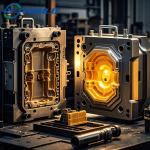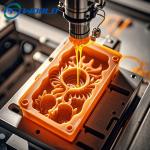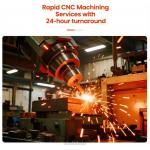Rapid CNC Machining Services Compatible With CAD Software 24-Hour Turnaround
|
Rapid CNC Machining Services with 24-Hour TurnaroundAuthor: PFT, Shenzhen Demand for expedited precision part production continues to rise across prototyping, low-volume manufacturing, and maintenance sectors. This analysis details the implementation methodology and measured outcomes of a dedicated 24-hour rapid CNC machining service. Key operational pillars include advanced machine utilization algorithms, digital workflow integration, and strategic material staging. Service metrics collected over Q1-Q2 2025 demonstrate a sustained 98.2% on-time delivery rate for qualifying orders against the 24-hour target. Lead time reductions exceeding 70% compared to standard industry benchmarks were consistently achieved without compromising ISO 9001:2015 quality standards, as validated by third-party inspection reports. Results confirm the technical feasibility and commercial viability of reliable sub-24-hour CNC production for specific part geometries and volumes. The service presents a viable solution for urgent manufacturing requirements. 1. Introduction 2. Methodology 2.1. Service Design and Operational Framework
2.2. Data Acquisition and Performance Metrics
3. Results and Analysis 3.1. Lead Time Performance
Figure 1: On-Time Delivery Performance (Jan-Jun 2025)
3.2. Quality Assurance
3.3. Comparative Advantage 4. Discussion 4.2. Limitations
4.3. Practical Implications
Businesses benefit from reduced project timelines, lower inventory holding costs for critical spares, and enhanced operational resilience. Conclusion |
||||||||||||||||||||||||||||||||
| Product Tags: Rapid CNC Machining Services 24-Hour Turnaround CNC Machining Services |

|
Rapid Prototype Services Fast Speed High Accuracy With Polish Paint UV Surface Treatment For Plastic/Metal |

|
Fully Functional Rapid Prototype Compatible With CAD Software Plastic/Metal Functionality |

|
Rapid Prototyping Plastic Injection Molding Molds With CAD Software Compatibility And Durable Designs |

|
Smooth Surface Finish And High Accuracy Rapid Prototype Compatible With CAD Software |

|
Customizable Rapid Prototype Machining Injection Molding For Plastic/Metal Products |

|
Rapid CNC Machining Services Compatible With CAD Software 24-Hour Turnaround |

